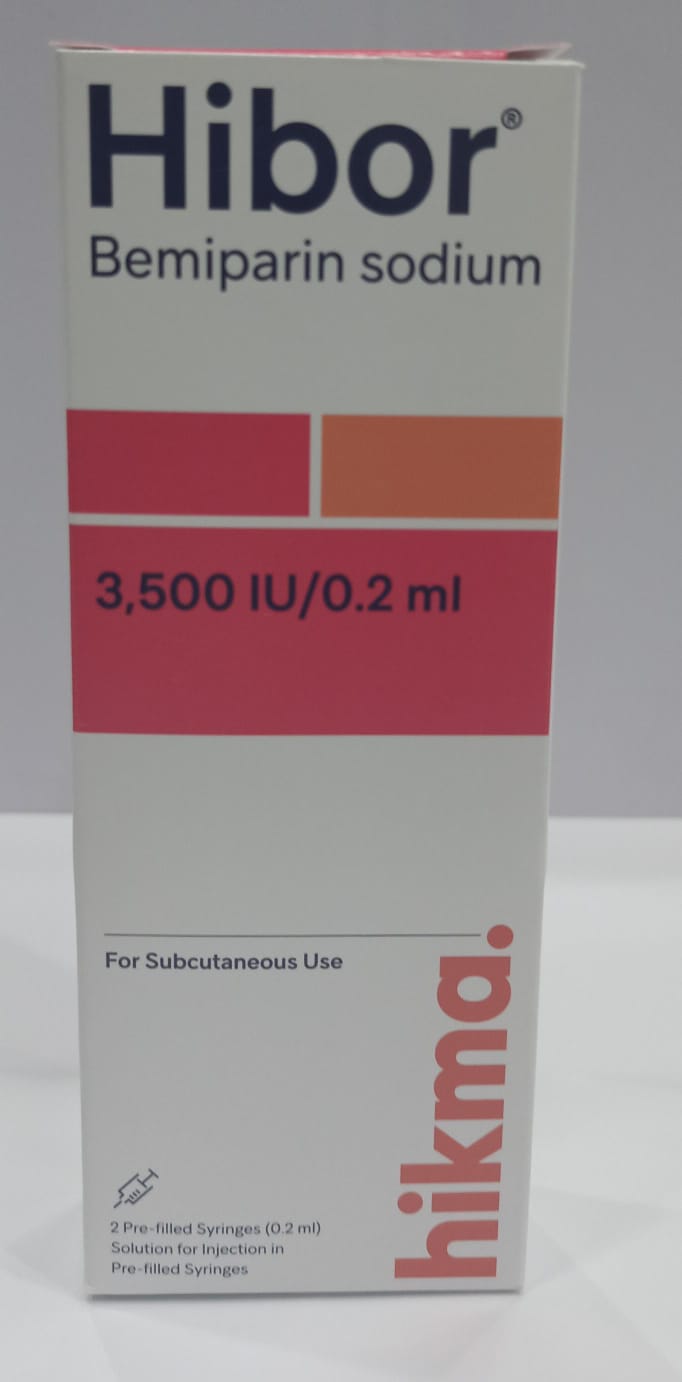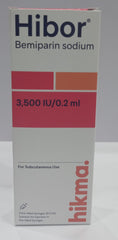شحن مجاني للطلبات فوق 100 ريال


ابر هايبور 3500 وحدة دولية مضاد للتجلط
-
39.65 SR

-

-
39.65

تعذر تحميل مدى توفر الطلب
الوصف
xابر هايبور 3500 وحدة دولية مضاد للتجلط
مكونات ابر هايبور
تحتوي حقن هايبور على بيميبارين صوديوم، الذي ينتمي إلى مضادات التخثُّر، التي تُساعِد على منع تكون الجلطات في الأوعية الدموية.
وتُعدّ حقن هايبور من الجيل الثاني من الهيبارين منخفض الوزن الجزيئي.
دواعي استعمال هايبور 3500
تُستخدَم حقن هايبور في:
- الوقاية من جلطات الأوردة بعد جراحة البطن العامة عند المرضى الذين لديهم خطر متوسط بالإصابة بالانصمام الخثاري الوريدي.
- الوقاية من مرض الانصمام الخثاري "الجلطات" عند المرضى الذين لم يخضعوا لعمليات جراحية.
- منع تكوين الجلطات في الدائرة خارج الجسم في أثناء الغسيل الكلوي.
- الوقاية من جلطات الأوردة بعد جراحات العظام الكبرى في المرضى الذين يُعانُون خطرًا عاليًا للإصابة بالانصمام الخثاري الوريدي.
- الوقاية الثانوية من تكرار الانصمام الخثاري الوريدي في المرضى الذين يُعانُون الخثار الوريدي العميق، ولديهم مخاطر عابرة له.
- علاج الخثار الوريدي العميق.
جرعة هايبور 3500
- تختلف جرعة هايبور حسب حالة المريض، وطبقًا لإرشادات الطبيب.
- عادةً يُعطَى الدواء مرة واحدة يوميًا.
- يتلقّى المريض حقنة هايبور على يد مُختص الرعاية الصحية.
- لا يُحقَن هايبور في العضل، ولا يُخلَط مع أي دواء آخر.
الآثار الجانبية لإبر هايبور
- النزيف.
- نقص الصفائح الدموية.
- الكدمات في موضع الحقن.
- زيادة مستويات إنزيمات الكبد مؤقتًا.
موانع استخدام هايبور
لا تُستخدَم حقن هايبور في حالة:
- الحساسية تجاه الهيبارين أو بيميبارين.
- سبق الإصابة بنقص الصفائح الدموية الناجِم عن الهيبارين.
- المرضى الذين يُعانُون من أي مرضٍ يُسبِّب نزيفًا مفرطًا.
- المُصابون بمرض الكبد الشديد.
- مرض البنكرياس.
- المرضى الذين يُعانُون التخثّر المنتشر داخل الأوعية؛ الذي يُعزَى إلى انخفاض عدد الصفائح الدموية الناجِم عن الهيبارين.
- التهاب بطانة القلب البكتيري أو التهاب الشغاف العدوائي.
- حالات النزيف الكبير النشط، مثل قرحة المعدة النشطة، أو السكتة الدماغية أو أورام الدماغ، أو حال المعاناة مسبقًا من نزيف المخ.
- الإصابة أو قُرب إجراء عملية جراحية في العين أو الأذن، أو الدماغ أو العمود الفقري.
- يُمنَع التخدير النصفي أو النخاعي في العمليات الجراحية إذا تلقّى المريض حقن هايبور.
التحذيرات
- لا يُستخدَم الدواء بالتبادل مع أي دواءٍ آخر، حتى لو كان هيبارين منخفض الوزن الجزيئي، فقد تختلف في طريقة التصنيع، أو الجرعة، أو الوحدات.
- لا تُستخدَم إبر هايبور بالحقن العضلي.
- في حالة التخدير النخاعي، يجب أن يبدأ العلاج بحقن هايبور بعد 4 ساعات من إزالة القسطرة، والجرعة التالية بعد انتهاء العملية.
- لا يُستخدَم هايبور للأطفال.
- لا تُوجَد أدلة كافية حول مدى أمن استخدام الدواء خلال فترة الحمل أو الرضاعة.
احتياطات الاستخدام
استشر الطبيب إذا كان لديك حالة من الحالات التالية قبل تناول الدواء:
- مرض الكلى.
- مرض الكبد.
- ارتفاع ضغط الدم.
- قرح المعدة.
- نقص الصفائح الدموية.
- الأمراض التي تزيد خطر النزيف.
التفاعلات الدوائية
يجب استشارة الطبيب قبل استخدام حقن هايبور بجانب أي دواءٍ آخر، خاصةً:
- مضادات التخثر الفموية.
- مضادات الالتهاب غير الستيرويدية.
- ديكستران.
- الجلوكوكورتيكويدات الجهازية.
الشحن و الاسترجاع
xسياسة الاسترجاع والاستبدال
هدفنا في متجر الجواهر هو رضاكم التام 🌸، ونسعى دايمًا نقدم أفضل تجربة تسوق بكل وضوح وعدل. نتعامل مع عملائنا بكل مصداقية، ونتمنى يكون التعامل متبادل بنفس الروح.
في حال تم طلب الإلغاء أو الاسترجاع قبل بدء الشحن، يتم إرجاع المبلغ كامل للعميل.
ويحق للعميل طلب الاسترجاع خلال مدة 3 أيام من تاريخ الاستلام، بشرط:
- أن يكون المنتج غير مستخدم ولم يتم فتحه.
- أن يكون بحالته الأصلية وخالي من أي تلف.
- ألا يكون المنتج من الأصناف المستثناة من الاسترجاع أو الاستبدال.
المنتجات غير القابلة للاسترجاع أو الاستبدال:
- المنتجات التي تحتاج تخزين خاص مثل: أدوية الثلاجة، الحليب، وأغذية الأطفال.
- مزيلات العرق ومنتجات العناية الشخصية والنسائية، إلا في حال وجود عيب مصنعي.
طريقة طلب الاسترجاع أو الاستبدال:
للطلب، يرجى التواصل معنا عبر واتساب على الرقم:
0563649160
في حال طلب الاسترجاع:
بعد التأكيد، يتم إرسال بوليصة شحن للعميل لتسليم المنتج لشركة الشحن وهو بحالته الأصلية.
بعد استلام شركة الشحن للمنتج، يتم إرجاع المبلغ بعد خصم قيمة الشحن خلال مدة من 5 إلى 7 أيام عمل.
في حال طلب الاستبدال:
يتم احتساب قيمة شحن جديدة للطلب البديل.
تنويه مهم:
في حال وصول المنتج بشكل خاطئ من شركة الشحن (باستثناء أدوية الثلاجة، الحليب، وأغذية الأطفال) أو تم إرسال منتج غير صحيح من صيدلية الجواهر المميز، يرجى التواصل مع خدمة العملاء، وبعد التأكد من المشكلة سيتم إرجاع المبلغ كاملًا بعد تسليم المنتج لشركة الشحن.
في حال وصول المنتج مفتوح أو مستخدم أو بحالة غير التي تم شحنه بها، سيتم إلغاء طلب الاسترجاع.
في حال كان الخطأ من شركة الشحن أو تم إرسال منتج خاطئ، نتحمل تكلفة إرسال المنتج لفرع شركة الشحن عبر تطبيقات التوصيل بحد أقصى 20 ريال، في حال كان الفرع بعيد.
في حال عدم استلام العميل للطلب وعودة الشحنة لنا، يتم إرجاع المبلغ بعد خصم قيمة الشحن، وإذا رغب العميل بإعادة الشحن مرة أخرى يتم دفع قيمة شحن جديدة.
منتجات قد تعجبك
آخر المنتجات التي شاهدتها
- يؤدي اختيار تحديد إلى تحديث كامل للصفحة.



